|
Any classic loss is gonna at least involve three people, what we refer to in How To Suck Less At Estimating as The Restoration Triangle.
As David Princeton, guest for The DYOJO Podcast Episode 100 says, "At a minimum, those are the three those are the three people that have to be involved in the claims process." Roles in the Insurance Claims ProcessAs The DYOJO wrote about previously in Cleaning and Restoration (C&R) Magazine, Throughout his career, Pete Consigli, The Global Restoration Watchdog, trained restorers to value the Restoration Triangle. Each party brings something unique to the table that should be heard and referenced as the agreed-upon scope is established:
Pete reminds stakeholders, “If one of these parties is left out of the process of determining and agreeing on the extent of damage, scope of repair, cost of restoration to a pre-loss condition, timelines, and criteria for satisfactory completion, then there will be problems.” A claim should not follow the narrative of a T.V. drama or a strategy for Survivor, whereby two members of the triangle team up to push their narrative through. For example, the contractor and client should not be in cahoots to figure out a way to “maximize the claim” without justification. This is fraud. Neither should the contractor and the carrier be working together to dwindle the scope. This is short-changing (and likely grounds for bad faith). Contractors and Carriers Working TogetherThe DYOJO wrote about contractors and insurance carriers working together from the same site documentation in Property Casualty 360 Magazine on the topic of Expediting Claims Processing. The goal or standard of claims processing is to create an agreed-upon scope of work to restore the damaged structure to resemble its pre-loss condition with materials of like kind and quality. I believe 360-degree capture tools will continue to improve and provide a valuable resource to all parties of a claim. If we want to arrive at an expedited, agreed-upon scope of work that is as accurate and thorough as possible, everyone in the claims chain will benefit from having access to the same information. Increased capacity while simultaneously elevating data capture and collaboration opportunities would seem to be reason enough for 360-degree capture integration in the claims process. For those who are reviewing the claim remotely, ask whether the company you are working with will share their virtual walkthrough. If there is a claims question, it will be helpful to access one of these resources so that carrier, contractor, and insured (the Restoration Triangle) can virtually access the three-dimensional capture of the affected area. I hope that carriers and contractors will see the value in the utilization and sharing of these resources. This content was adapted from The DYOJO Podcast Episode 100 "Matching Materials for Insurance Claims" with David Princeton and Bill Wilson.
0 Comments
David Princeton of Advocate Claim Service joined us for The DYOJO Podcast Episode 100. He had this piece of advice for contractors working in the complex world of restoring homes during an insurance claim. The best thing a contractor can do is not tell somebody what they think. The best thing a contractor can do is ask strategic questions to reveal what the other person is thinking. When asked by host Jon Isaacson, David elaborated that the contractor should always use questions to discover what their customer and the insurance carrier know or understand about the loss. The customer has important details about the loss occurrence to bring to the claims process. The carrier has important details about the terms of the policy to bring to the claims process. All I all I do is I ask the strategic questions that I can anticipate answers to, but I want to understand what they know. Whether a claim is adversarial or not, the contractor should first listen and seek to understand what the other parties understand so that they can respond appropriately. It's not important if I know it. I want to know what they know. And I want them to explain to me what they know. And then I want to ask follow up questions about what they've explained to me so that I'm understanding The reader can hear more of this conversation with David Princeton and author Bill Wilson on The DYOJO Podcast Episode 100. The topics on this episode include matching materials for insurance claims repairs and the role of public adjusters in the claims process.
Contractors who specialize in property restoration and insurance claims are invited to join the Fellowship of Construction Knowledge and Entrepreneurial Development (FoCKED) for a monthly networking meeting. On Tuesday, April 11, 2023 the group will gather at Arken Restoration in Tacoma, Washington to discuss Valuing Your Business (Even If You Aren't Selling). This construction focused discussion will be facilitated by guest presenter Ryan Hemmert of Washington Business Brokers (Seattle, WA). Find out how you can be invovled and more events for contractors by checking out the FoCKED Events Calendar. MEETING 017 April - Valuing Your Business (Even If You Aren't Selling) PLEASE RSVP through EVENTBRITE WHEN: Tuesday, April 11, 2023 Time: 10-1130am PST THANK YOU to our host: Andrew Park of Arken Guest Presentation by Ryan Hemmert of Washington Business Brokers Ryan Hemmert partners with privately-held business owners to think strategically and position for a successful sale of their most valuable asset – their business. As a business owner, he shares an owner mindset and can relate to the ups, downs, hard work and grit entailed in building a business. He welcomes the opportunity to partner with business owners and help them accomplish their goals. Be sure you are on our MAILING LIST for the calendar invite. WHERE: Arken 417 99th St E #201 Tacoma, WA 98445 Rough Agenda:
At a local meeting for restoration and insurance claims contractors in Washington, someone brought up a new "health hack" shared by actress Gwyneth Paltrow. Contractors may be encouraged to add on a revenue stream for their business with their existing equipment, i.e. ozone machines and wall drying systems. The actress says, "It's pretty weird," but, "It's been very helpful." The procedure she was discussing was ozone insufflation or rectal ozone therapy. Listen to Episode 100 of The DYOJO Podcast to hear more about this concept. In the wake of Hurricane Ian, Florida's Chief Financial Officer Jimmy Patronis went on television to warn consumers about unscrupulous contractors and public adjusters. Patronis refered to them as "locusts" and "predators" that complicate the recovery process. He encouraged residents to contact their insurance agent, carrier representative, or his office rather than any other party. He announced that there will be an "insurance village" where the government and the insurance companies are working together to write checks. The date of this speech was September 29, 2022 as part of a presentation with Governor Ron DeSantis. Florida CFO Labels Contractors and Public Adjusters "Locusts" and "Predators"Transcript from the Jimmy Patronis video shared above: Now here's the most important thing I need you to take away from this conversation. The predators that are going to come up, they're gonna initially try to sign up construction management contracts, public adjuster, they're going to come in like a bunch of locusts. And they're trying to hit the neighborhoods. And people are vulnerable right now. They're going to look for a solution. And their solution is always going to be important. But that solution is not going to be knocking on the door every time. If it sounds too good to be true, it is. Please, that first phone call that you're going to make needs to be to your agent, your carrier, or to my office at 1-877-MY-FL-CFO. If one of the first three phone calls you make in your house in order to get an insurance claim settled is one of those three, there's almost zero chance you can be taken advantage of. But, Panama City was my hometown, I lived through Hurricane Michael. We did. We did 12 Insurance villages there over a year sponsored. We're going to be here bringing the carrier's back. And they will write checks on site. Okay. But when you start complicating the claim, because you've allowed predators to get involved with your claim, you're going to drag it out. So the best solution is between you, your carrier, and us. The more people you bring into it, the harder it's going to be to get a settlement that's going to be fair for everybody. And look at the end of the day. If your carrier doesn't want to work with you. That's when you call my office and we'll take them to task." Predatory Practices During Insurance ClaimsIn a state whose insurance system is so much in disrepair and has come under so much scrutiny, not just in the last couple of years, but for quite some time now. There's no mention of the insurance company's participation, or the state's mismanagement, or the government's inability to effectively help shift things back into the right order. There is no accountability for Patronis, the government, or the insurance companies. Even the policyholders have some responsibility when consumers seize upon the opportunity to use an event to their Betterment rather than just to their repair. Patronis says, "The predators that going to come in like a bunch of locusts" while "people are vulnerable." No one would dispute that there are bad actors in all sectors. What left many people questioning his choice of words was the stutus of the insurance claims industry and process in his state. There are predatory practices in the insurance claims industry, Mr. Patronis places a lopsided amount of the blame on two parties in particular, contractors and public adjusters. Are door-to-door sales predatory? Are we to understand that if a consumer who has someone knocking on the door offering to provide a service that they need the logic of the CFO of the state of Florida says that they are likely a predator? If this is the case, what is his solution? Patronis instructs consumers to call their agent, their insurance company, or his office (the government).
Patronis says that if your first call is to one of the three members of the good team, "There's almost zero chance you can be taken advantage of." I think history has shown, especially in the state of Florida, that no one cares more for the consumer than the government and the insurance companies, right? The Jimmy Patronis Claims RemedyIf a policyholder who has severe damages to their home in the state of Florida follows Patronis' advice, how does the reader think this scenario will play out?
The policyholder calls their local insurance agent. Hmmm, does the reader forsee any issue there? A local insurance agent who lives in the same hurricane ravaged area as the policyholder. If they aren't dealing with their home and office being destroyed, what is the likelihood that their office phone is overwhelmed with similar calls? What is the chance that the consumer gets through to their local insurance agent, it's probably very low. So, what should they do, just keep calling and wait patiently until they can get through?
The policyholder calls their insurance company's claims line. After a catastrophic event, it's likely that they will get through quickly and that the carrier will have a representative out in a timely manner as well, right? The reader knows that hurricane recovery is a process and it takes time. But, does that mean the home or business owner should keep calling and wait patiently until they can get through?
The policyholder calls the office of Jimmy Patronis. After a catastrophic event, it's likely that they will get through quickly and that the carrier will have a representative out in a timely manner as well, right? The reader knows that hurricane recovery is a process and it takes time. But, does that mean the home or business owner should keep calling and wait patiently until they can get through?
Mr. Patronis says his office will model prior hurricanes and create an insurance village where carriers will be writing checks onsite. If the reader watches the video clip from The DYOJO Podcast or reads the transcript, Jimmy advises, "If it sounds too good to be true, it probably is." But of course, his statement wouldn’t apply to the government or the insurance companies (the good guys) only to the bad guys. If consumers don't wait for the government and the insurance companies to get their insurance village set up and then meet them there, Patronis says they are at fault? Protecting Consumers By Reducing Their RightsMost people listening to the Patronis speech get caught up in the "locust" comment. But there are so many items he brings up that are far more concerning. Jimmy wants policyholders to make the calls, wait for the answers, and then join him in the insurance village for their check. He warns consumers, "When you start complicating the claim, because you've allowed predators to get involved with your claim, you're going to drag it out." In summary, Jimmy says that policyholders complicate their claims and drag them out by allowing predators into the process. Jimmy says that policyholders complicate their claims and drag them out by allowing predators into the process. As we have said many times, The Restoration Triangle should be respected. The policyholder, the contractor, and the insurance carrier each have roles and responsibilities during the claims process. If the consumer does not believe that the claims process is going the way it should, that the policy is not being enforced the way it was sold to them, or the way it is stipulated in their insurance policy, then claims advocates, public adjusters, and lawyers are options well within their rights. When Patronis encourages consumers not to understand nor exercise their rights is the government playing its role in protecting the consumer? If there was a contractor or a public adjuster or a lawyer that was advising policyholders to ignore their insurance company, that could be a legitimate orange flag. The consumer, their contractor of record, and the carrier each has a role to play. The carrier should not overstep in the relationship between the contractor and the consumer. Nor should the contractor overstep in the relationship between the carrier and the policyholder. The claims questions should include:
Accountability For All Claims PredatorsPatronis says his office is going to "Be here, bringing the carriers back, and they will write checks onsite." His message is, "Come trust the government and the insurance companies. Don't exercise your rights to consult with a contractor, public adjuster, or a lawyer." What is the reason that a policyholder should not exercise their rights? According to the CFO of Florida, it will complicate the process of reaching an outcome that is “fair for everybody”. Bad actors should be called to account. Yet, the disbursement of consequences is as lopsided as the disbursement of funds from those holding the policy monies. As we have discussed before, if a policyholder is negligent or misrepresents the truth on their claim (i.e. fraud), they can be criminally prosecuted. If an insurance company delays, denies, or defends a claim, to the detriment of the policyholder, they are often civilly prosecuted at most. The consumer may go to jail while the carrier may only pay a fine. As David Princeton, author of the C&R Magazine segment “Dear David”, mentions in the closing segment of this video clip from The DYOJO Podcast, "Is there something that needs to be done? Certainly. But I also think something needs to be done on the carrier side because at least on the public side there's scrutiny to look at that and on the carrier side there's no scrutiny." This video and this article are not dismissing the reality of predatory practices by contractors, public adjusters, and lawyers, but calling for equal scrutiny of the people claiming to be the solution. The DYOJO Podcast Episode 100 will feature Bill Wilson, author of When Words Collide: Resolving Insurance Coverage and Claims Disputes, as well as David Princeton, Advocate Claim Service.
On Tuesday, June 13, 2023 the Fellowship of Construction Knowledge and Entrepreneurial Development (FoCKED) plans to host a mini mitigation summit in Washington state. We are working out the details of this education and networking event but here is what we know so far: Location: We will be working with the June FoCKED host American Water Damage Restoration to secure a location in the Edmonds, Washington area. Topics and Presentations from local water damage mitigation professionals:
Training The Next Generation of Restorers Hiring and retaining quality staff is consistently listed among the toughest challenges in the skilled trades. Restoration owners and managers will share their experiences recruiting, hiring, training, and developing the next generation of water damage professionals. Using Technology In To Elevate Restoration How can modern restorers utilize technology to increase their ability to deliver quality service in their local markets? Restoration owners and managers will share their experiences with which technologies have been effective in elevating the services within their companies. Creative Solutions For Challenging Scenarios It’s one thing to learn how to dry a structure within a controlled environment, but how do restorers train their teams to problem solve for an endless variety of complications on the job site? Restoration owners and managers will share their experiences with sourcing creative solutions from the industry and within their own teams to meet challenging water damage scenarios. Understanding and Implementing Industry Standards Restorers express frustration over the lack of knowledge from many service providers claiming to be water damage mitigation experts. Restoration owners and managers will share their experiences with understanding and implementing standards within their organization as well as ways they have worked to help their peers do the same. Getting Involved If you are a contractor, property restoration business owner, or water damage professional, please reach out to The DYOJO to hear more about our monthly education and networking meetings for contractors in Washington State. We look forward to meeting with you on the second Tuesday of every month. Check out our FoCKED Events Calendar for more information on our regular meetings and special events. |
Words
The DYOJO - helping contractors shorten Archives
June 2024
Categories
All
EstimatingMarketingInsurance ClaimsLeadership |
|
| |||||||

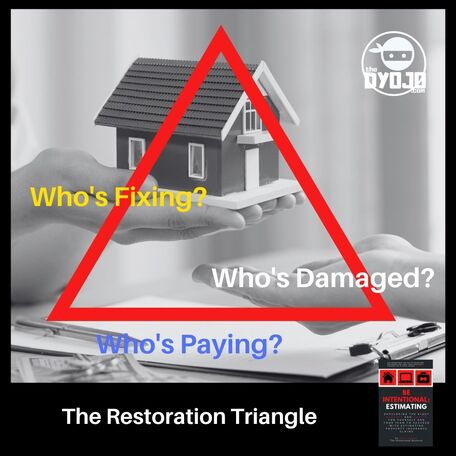
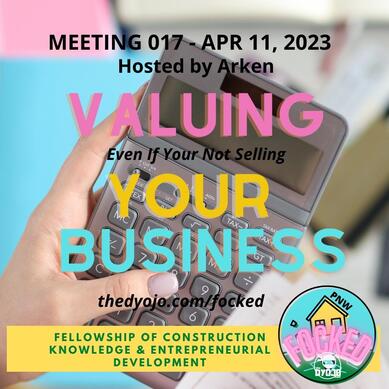
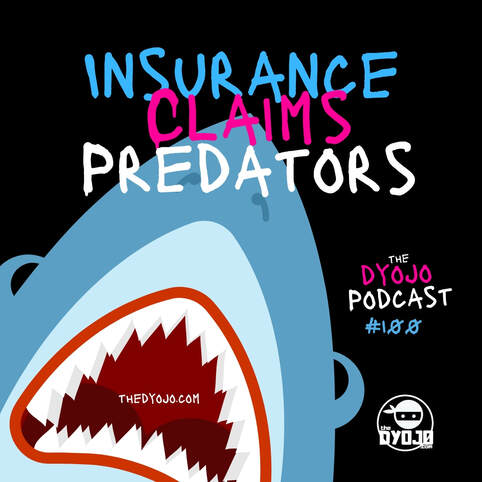
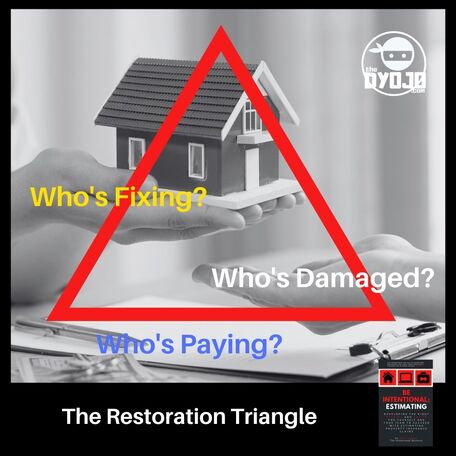
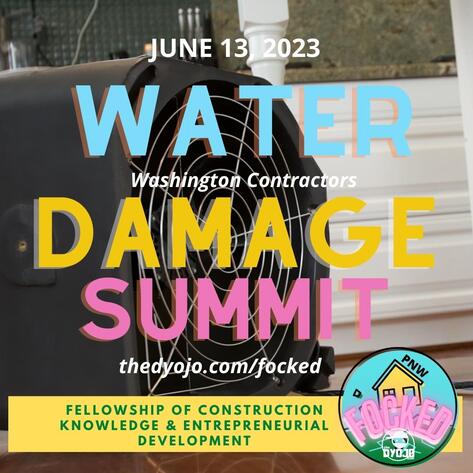
 RSS Feed
RSS Feed
